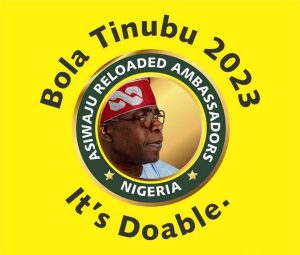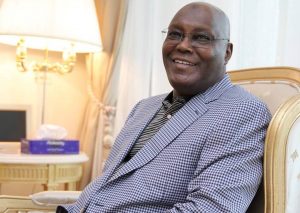Former governor of Lagos State in Southwest Nigeria and a mandarin of the All Progressives Congress, (APC), Bola Ahmed Tinubu, must have an active student of John Austin’s How to Do Things With Words among his intellectual commanders. Although the two definitive framings of his entry into the 2023 presidential race this week were headlines cast by editors, the editors based their craft on the original text. One of the headlines said the man generally referred to as the Lion of Bourdillion is consulting widely. The second is that he would not turn down the wishes of Nigerians on the question of contesting the presidential position. These are classics in terms of ‘how to do things with words’. A decision presumably based on wide consultations speaks to one that has taken note of all angles to the issue and is, inherently, democratic. Additionally, bowing to the wishes of the people has got even a theological dimension since the voice of the people is believed to be the voice of God. There is a sense in which Tinubu is unfolding as an ‘early warning’ that the 2023 campaign in Nigeria may turn out to be the most sophisticated enactment of ‘simulacra’ in Nigeria so far.

A coming language war eh?
It could be said that Bola Tinubu has prepared himself for the moment ahead. Although an individual cannot make history casually, individuals are not necessarily prisoners of the conditions foregrounding them. There is something called agency. Context and agency are co-constitutive in the making of history. Otherwise, how could it happen that, by early 2016, a conservative, thoroughly pro-Buhari media retiree could be heard saying nobody would be allowed to undermine Bola Tinubu. It was in his house in Kaduna. He was reacting to a developing story involving opposition to Tinubu by someone or a group in early 2016, going on to narrate how Tinubu had sold the idea of a merger between his camp and the Buharists as early as 2011. It was ignored, embraced only in the build up to 2015 when it worked. As far as this speaker was/is concerned, anybody who brought Buhari to power could not be trifled with. He mentioned so many ways by which Buhari was soon going to restore Nigeria. Intervention has not seen him in the past few years as to know his views on what might have happened to the Buhari plans on restoring Nigeria he spoke about then.
Outside of the Buhari circuit, Tinubu had appeared at the 10th anniversary of Dr Bala Usman in 2015 where he was talking about how financialisation has captured Nigeria, a reference to the extroverted character of the Nigerian economy. It was an intriguing statement from someone with no history of anti-imperialist radicalism. Even if he was playing to the gallery, it was important he documented and circulated his position.
One of his contentions at the 2021 Sardauna Memorial Lecture on March 27th, 2021 at Arewa House in Kaduna, where he was the Chairperson is that “The development of any populous nation has always been dependent on the ability of government to allocate sufficient funds to projects and programs that create and encourage enduring growth and employment. We must reject that mode of thinking that assumes government expenditure is inherently unproductive as well as harmful to the overall economy”
He also said on that occasion that “Fiscal wisdom but not necessarily austerity is required for an economy like ours in a time like this, to ensure equitable wealth redistribution and meaningful use of resources. The years have shown that the private sector is much too weak to spur the growth we need. If the private sector could manage this feat, it would have already done so. Where the private sector is too weak or unable, the government must fill the void. This means government must not be afraid to embark on an activist fiscal policy to create jobs, build infrastructure and develop our industrial sector as well as continue to improve agriculture. This means government must spend money but spend it on those things that bring the requisite economic returns for the nation”
And added that “Here, government must implement a national industrial policy to encourage key industries that begin to employ this growing urban work force”
“The issue of insecurity, poverty, unemployment and extremism have many things to do with governance, over time. At bottom we must tackle our deep and widespread poverty. If we limit government’s role under the erroneous assumption that government spending is intrinsically unproductive then we tether ourselves to failure. We would do well to more critically study how other populous nations such as the UK, US, Germany and China charted their course during their formative years. You will see that they did not adhere to small government or the purportedly free market. Government engaged in massive spending on infrastructure and education while also engaging in policies that protected industrial development and key aspects of the agricultural sector. Only when they matured and held advantages over other nations, did the UK and US begin to champion free markets and small government. We would do well to understand this history and learn what it means for our own pursuit of development”

Alhaji Atiku Abubakar, the most formidable of the plausible 2023 presidential aspirants from the clan of traditional politicians
It is still difficult to make a claim regarding what statements such as above convey of him, ideologically speaking. They don’t make him an Awoist. Perhaps, it makes him a sort of another MKO Abiola – managing capitalism by creating an elite circle beyond Yoruba heartland. In other words, this looks more like a hesitant Awo rather than the real Awo with a serious thinker in the mould of a Sam Aluko and his ‘Guided deregulation’ variant of statism. Rapid industrialization might not be Tinubu’s forte.
But, within that spectrum, he would be a contrast to Atiku Abubakar, for example, whose formal entry into the race is a matter of time but whose own idea of development is the private enterprise. It is summed up in his famous statement about privatizing the Nigerian National Petroleum Corporation, (NNPC) no matter the consequences for him. Having been Vice-[resident, his critics are ready to concede that he might know what he is talking about but they also wonder if such is not the error of essentialism. It would be interesting to see whether Atiku is withdrawing the statement or reinforcing it in 2023.
So, while Tinubu and Atiku, (if and when he dances into the arena eventually) capture different spasms of a ruling class, they still converge as the leading lights of a same class as far as 2023 is concerned. Might they, collectively, be heading for their waterloo in the hands of radical challengers? Whenever Atiku formally does the dance, his case would be taken. For now, only Tinubu can be taken.
No science that can foretell whether Tinubu will win the race or not. Only a listing of certain variables that will be decisive can be attempted. One of that would be Northern idealism. Northern Nigeria could repeat that trait again as it did during Abiola: mu zabe shi mu gani – (let’s vote him and see). That is to say that, like Abiola, Tinubu also has an image that the popular masses might want to explore. So, what we can call Northern idealism could be a variable. It is itself produced by a combination of factors but it can be real.
Two, Tinubu is not a marginal player in the politics of the APC. A party mandarin cannot be a marginal player. As Intervention once wrote, Tinubu is the one doctor who has kept the APC alive, doing so in all the forms and sites requiring political transfusion, especially sending lifelines to states that do not have APC governors and acquiring so much clout across the country.
In any case, even as people were saying that Tinubu was being stabbed at the back with the composition of a caretaker committee in mid-2020, he alone had no less than 10 out of the 13 members connected to him one way or the other, many of whom the incentive for ditching Tinubu does not exist. It is unlikely that things have changed since last year. This is the List of the APC Caretaker Committee and Extra-ordinary Convention Planning Committee: Governor Mai Mala Buni (Yobe) Chairman; Isiaka Oyebola SW; Ken Nnamani SE; Stella Okorete – Women Rep; Governor Sani Bello NC; Dr. James Lalu physically challenged; Sen. Abubakar Yusuf- Senatè Rep; Hon. Akinyemi Olaide – Reps; David leon – SS; Abba Ari –NW; Prof. Tahir Mamman – NE; Ismail Ahmed – Youth and Sen. Akpan Udoedehe- Secretary.
Three, he has got ample resources, to put it mildly. In Nigerian politics in particular, that can make things happen
Four, he has got intellectual commanders who can simulate scenarios that takes them out of vulnerability to surprise attacks.
Five, he has helped people, a point that will not be elaborated.
A sixth point that could also help his cause is identity. As a Yoruba Muslim, the dynamics could work out in a manner that he becomes a beneficiary of the criss-crossing layers of identity in the body politics. This is something like another dimension of the Abiola scenario earlier referred to – an individual whose many sidedness positioned him to beat all junta manipulations deployed to block him till he first breasted the tape.
In a long race, the dynamics could privilege any of these variables in Tinubu’s favour or against him at any point, depending on nothing of his own initiative at all..
However it goes, there might be nothing more entertaining than watching an Atiku Abubakar, a Tinubu and perhaps an ideological challenger slug it out in a presidential contest..





























1 Comments
Pingback: Is Mohammed Hayutu-Deen, Indeed, the Contender to Beat in 2023? - Intervention